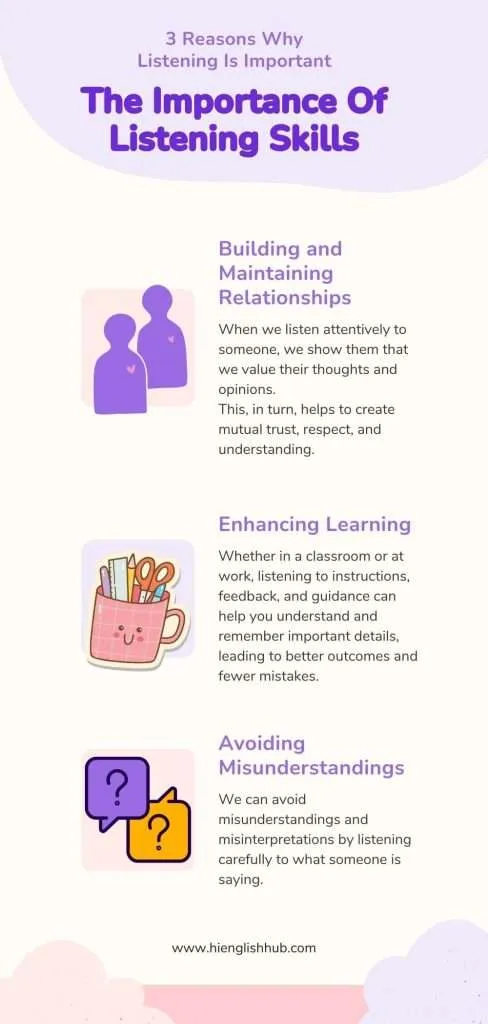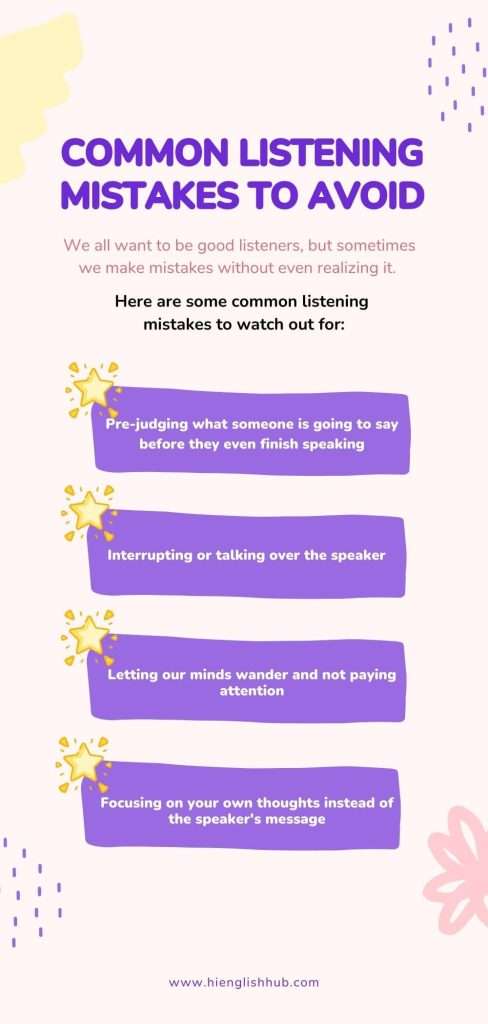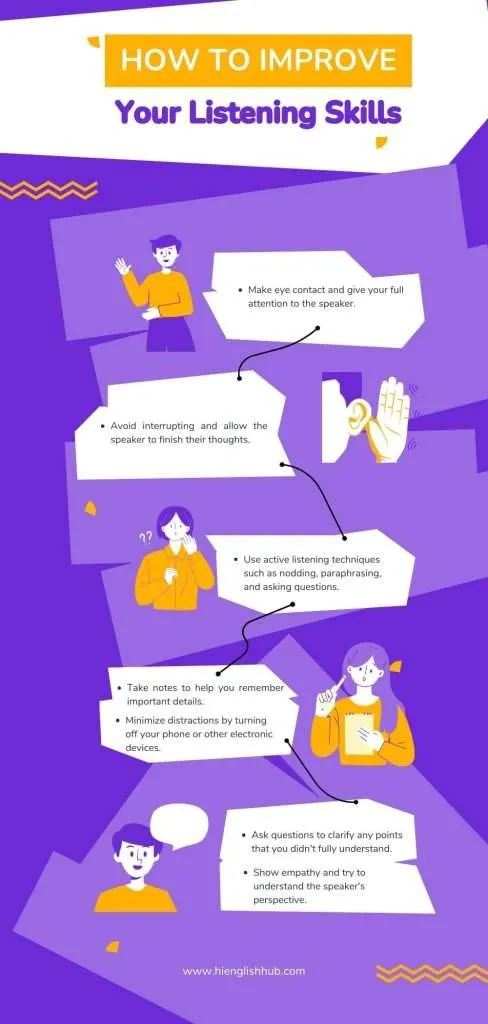Have you ever been in a situation where you thought you were listening but then realized you missed important details?
We’ve all been there!
It’s easy to get distracted or not pay attention when someone else is speaking.
But did you know that listening is an essential skill that can help you in many aspects of life?
In this blog post, we will chat about why listening is important and give you some tips on how to improve your listening skills.
Whether you’re a student trying to excel in class, a professional striving for success in the workplace, or simply someone who wants to improve your communication skills and build better relationships with others, being a good listener can make all the difference.
So, grab a comfy seat, and let’s get started!
What Are Listening Skills?
Alright, let’s start by breaking down what we mean by “listening skills.”
When we talk about listening skills, we’re not just talking about hearing words being spoken.
It’s a lot more than that!
Listening skills involve paying attention to both the words being spoken and the nonverbal cues that come along with them, like body language and tone of voice.
It’s about truly understanding what someone is trying to communicate to you.
So, listening skills are basically the abilities we use to comprehend, interpret, and respond to what someone is saying.
That makes sense, right?
The Importance Of Listening Skills: 3 Reasons Why Listening Is Important
Have you ever heard the phrase “you have two ears and one mouth for a reason”?
That’s because listening is so important!
Here are three reasons why:

1. Building and Maintaining Relationships:
Listening is a key ingredient for building healthy relationships.
When we listen attentively to someone, we show them that we value their thoughts and opinions.
This, in turn, helps to create mutual trust, respect, and understanding.
2. Enhancing Learning:
Good listening skills are essential for absorbing new information and ideas.
Whether in a classroom or at work, listening to instructions, feedback, and guidance can help you understand and remember important details, leading to better outcomes and fewer mistakes.
By truly tuning in to what someone is saying, we can learn from them and gain a deeper understanding of their perspective.
3. Avoiding Misunderstandings:
When we don’t listen carefully, we can easily misinterpret what someone is trying to communicate.
This can lead to confusion, conflict, and missed opportunities for connection and growth.
We can avoid misunderstandings and misinterpretations by listening carefully to what someone is saying.
The Importance Of Listening Skills In English
We often focus on speaking and writing skills when learning a new language.
However, listening skills are equally important for improving language competence and fluency, particularly in English.
Here are a few reasons why:
- Understanding different accents: English is spoken in many different accents worldwide, and listening skills can help you better understand these variations.
- Improving comprehension: By actively listening to English speakers, you can improve your comprehension skills and better understand the meaning behind the words.
- Enhancing communication: Effective communication in English requires both speaking and listening skills. Improving your listening skills can help you engage in more meaningful and productive conversations.
So, how can you improve your listening skills in English?
A great way is to practice listening to native speakers, whether it’s through podcasts, movies, TV shows, or in-person conversations.
Focus on identifying keywords, paying attention to intonation and stress, and practicing active listening techniques such as asking for clarification or summarizing what you heard.
By doing so, you’ll not only improve your language proficiency but also become a more confident and effective communicator in English.
The Importance Of Listening Skills In Communication
Have you ever had a boss who just wouldn’t listen to you, even when you had a great idea?
Or maybe you’ve been to a store where the customer service rep didn’t seem to care about your concerns?
Poor listening skills in the workplace can lead to frustration, misunderstandings, and even lost opportunities.
That’s why it’s so important for managers, employees, and students alike to develop good listening skills.
For managers, active listening is crucial to understanding their team members’ needs and concerns, which can lead to better decision-making and a more productive work environment.
Similarly, listening skills are important for students to succeed academically. By actively listening to teachers, classmates, and course materials, students can better understand and retain information, participate in class discussions, and achieve better grades.
In nursing and counseling, listening skills are a key part of patient care. By actively listening to patients, healthcare professionals can better understand their symptoms and concerns, leading to more accurate diagnoses and better treatment plans.
In customer service and sales, listening is critical to identifying customers’ needs and providing effective solutions. By listening carefully and empathetically, representatives can build rapport with customers and establish long-term relationships.
Whether in a management position or a customer-facing role, developing strong listening skills can help you be more effective in your job and build better relationships with colleagues, clients, and customers.
Common Listening Mistakes To Avoid

We all want to be good listeners, but sometimes we make mistakes without even realizing it.
Here are some common listening mistakes to watch out for:
- Pre-judging what someone is going to say before they even finish speaking
- Interrupting or talking over the speaker
- Letting our minds wander and not paying attention
- Focusing on your own thoughts instead of the speaker’s message
- Assuming we already know everything about a topic and not being open to new information
- Being distracted or multitasking during the conversation
How To Improve Your Listening Skills

Becoming a better listener requires practice and effort.
Here are some practical tips to help you improve your listening skills:
- Make eye contact and give your full attention to the speaker.
- Avoid interrupting and allow the speaker to finish their thoughts.
- Use active listening techniques such as nodding, paraphrasing, and asking questions.
- Take notes to help you remember important details.
- Minimize distractions by turning off your phone or other electronic devices.
- Ask questions to clarify any points that you didn’t fully understand.
- Show empathy and try to understand the speaker’s perspective.
- Practice mindfulness and meditation to improve concentration.
If you’re interested in improving your listening skills, you might also want to check out Julian Treasure’s TED talk on “5 Ways to Listen Better.” It’s a great resource for anyone looking to become a more effective communicator.
The Importance Of Listening Skills: FAQ
What Are The 5 Benefits Of Listening?
The five benefits of listening include improved communication, better relationships, enhanced learning, reduced conflicts, and increased empathy.
Which Scenario Shows A Student Demonstrating Good Listening Skills During A Class Discussion?
It’s important to show good listening skills in formal settings like lectures or presentations and in more informal settings like class discussions.
When participating in a class discussion, a student who demonstrates good listening skills is someone who pays attention to what their classmates are saying, responds thoughtfully to their comments, and asks questions to show that they understand and respect others’ perspectives.
This can help create a more collaborative and respectful learning environment for everyone involved.
Final Thoughts
Listening skills are essential in every aspect of our lives, whether it’s at school, in the workplace, or in our personal relationships.
With practice and persistence, you can become a great listener and reap the many benefits that come with it.
Happy listening!
If you enjoyed this post, share it with your friends and followers on social media.
Before you leave, don’t forget to follow me on Pinterest and Twitter for more informative content like this.
I appreciate your support! :)


